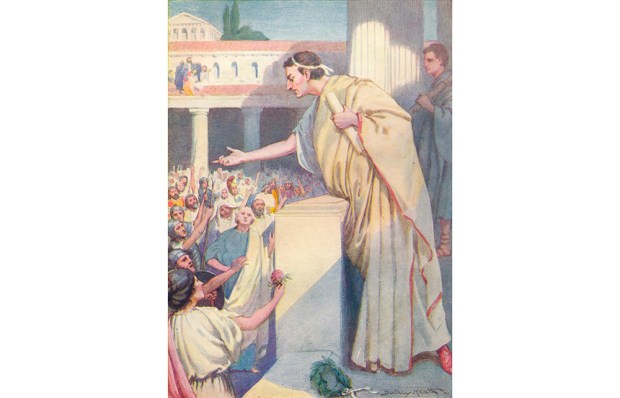The Covid-19 pandemic is apparently causing a large number of mental health problems. On that subject, one could do a lot worse than read the Roman poet Horace (65-8 BC).
An attractive feature of Horace’s views about man’s efforts (including his own) to enjoy the good life is that you have to laugh about it all. He reflects that everyone thinks others better off than they are and envies their good fortune, but if a god told them to swap jobs, they would all refuse, thus (apparently) giving up their chance to be happy. And what would Zeus think of that — no more answers to your prayers!
‘Harvest the day (carpe diem),’ Horace says, ‘and don’t put too much trust in the next’ i.e. enjoy what you have and forget about tomorrow. Whatever you desperately long for, you must discover what will ‘make you a friend to yourself’ (quid te tibi reddat amicum), and that, for Horace, means living a simple life, not in eternal suspense about what the next hour will bring.
Just long for what is enough (quod satis est): to that end, the one thing to make and keep you happy is nil admirari (‘not to stand in awe of anything’), especially not possessions or public esteem.
Friends, of course, are of great importance: choose them for their qualities, not their status or wealth, people who will support you, and you them, when troubles arise. Erotic passion? Enjoy it while it lasts, but know that it will end in tears. As for death, relax: life is brief and insecure enough as it is. We are all in the same boat: Charon’s.
This summary, reminiscent of Christmas crackers and Thought for the Day, does not do justice to Horace’s sophisticated, resonant poetry. His take on life is that to be happy in one’s own skin requires an inner mental self-sufficiency which is proof against whatever frustrations, disappointments and changes in external circumstances life throws up. One is then in charge of the situation, not its helpless ‘victim’.
With thanks to Stephen Harrison and How to be Content: Horace(Princeton)
Got something to add? Join the discussion and comment below.
Get 10 issues for just $10
Subscribe to The Spectator Australia today for the next 10 magazine issues, plus full online access, for just $10.
You might disagree with half of it, but you’ll enjoy reading all of it. Try your first month for free, then just $2 a week for the remainder of your first year.














Comments
Don't miss out
Join the conversation with other Spectator Australia readers. Subscribe to leave a comment.
SUBSCRIBEAlready a subscriber? Log in